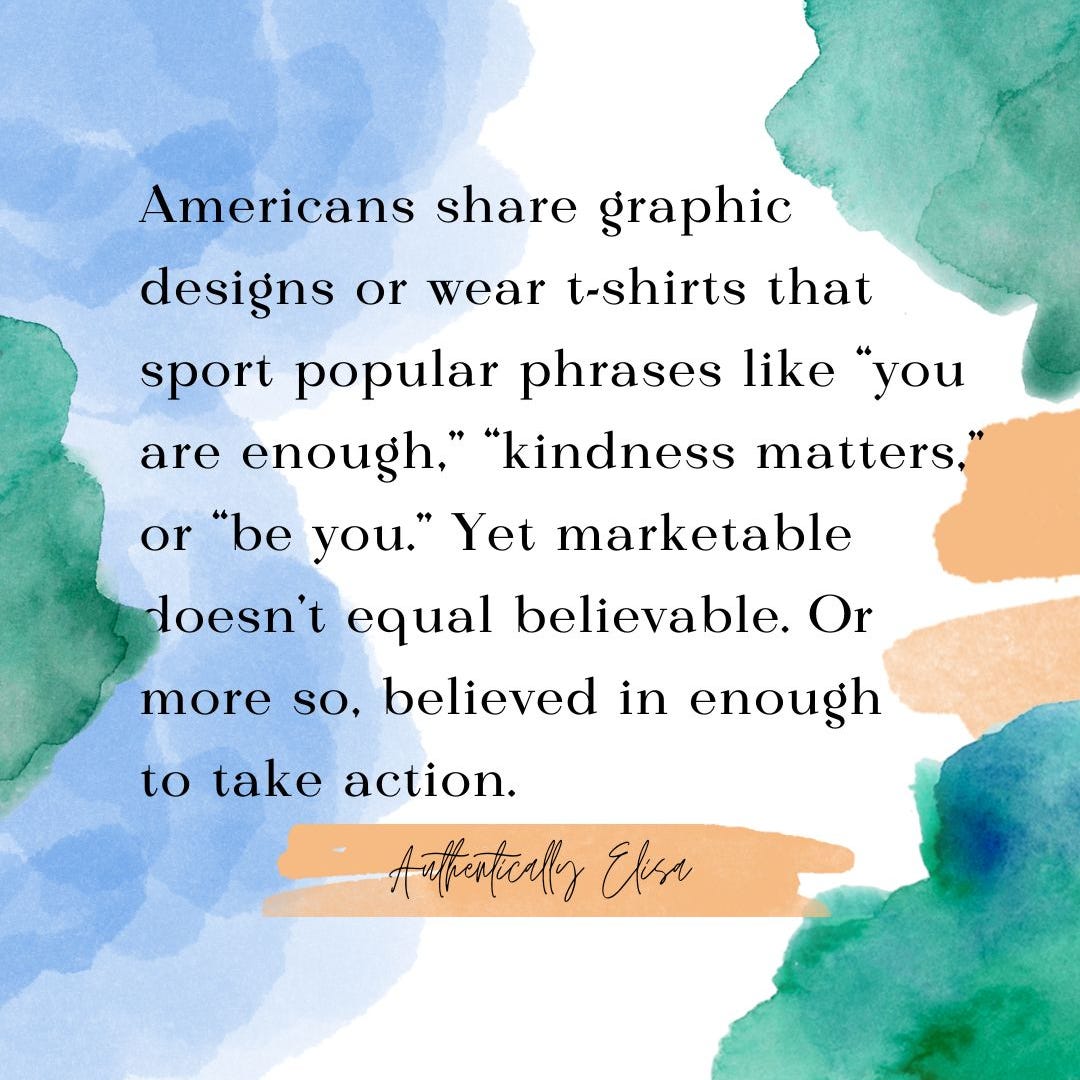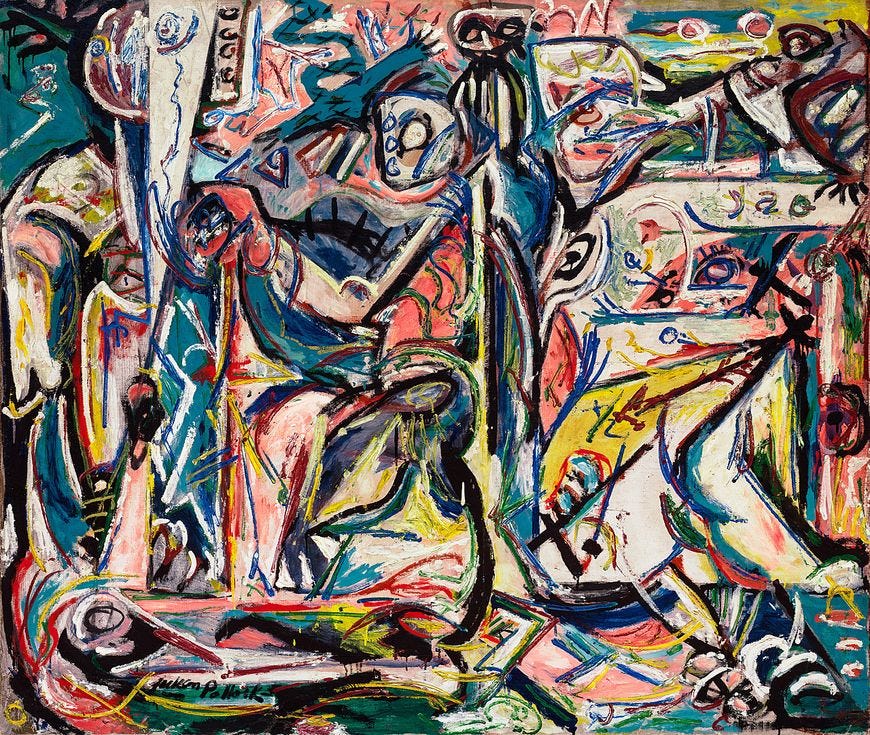Authenticity and the Cure to Cancel-Culture
An Art of Authenticity post on culture, judgement, genuine change and destructive babies
The other day my baby smashed graham cracker into the carpet, spilled my twenty-ounce glass of lemonade, and angrily flailed against me, until he whacked his head on the coffee table because I was trying to take a piece of foam out of his mouth. How dare I, as his mother, prevent him from choking again! This succinctly depicts the damage a ten-month old inflicts through the course of an average morning. Isn't parenting wonderful?
And yet, despite his frequent despicability, for some reason, I haven't cancelled my baby yet. I have another practice that works so much better.
Our culture loves hates authenticity
Our culture declares that it values authenticity. I know I do. I cheer when I don’t people-please. I am thrilled when my vulnerability brings a deeper connection. But I’ve also been rejected, judged and cancelled because I brought my best-self to the table.
Americans share graphic designs or wear t-shirts that sport popular phrases like “you are enough,” “kindness matters,” or “be you.” Yet marketable doesn’t equal believable. Or more so, believed in enough to take action.
For example, Americans rarely practice acts of kindness. My experience doing our annual #KindnessQuest has opened my eyes to this reality. And humankind is forever competing and climbing on each other to prove they are enough. It is why “you are enough” has become a mantra, for the meaning hasn’t sunk deeper than our skin. In the same way, while we are applauding authenticity from the front, we sharpen knives behind our backs. It was about time this type of boycott-rejection-judgement was given a name—hello, cancel-culture!
Cancelling
Our wizened, sans serif, and silver-bearded Merriam-Webster defines cancelling like this:
“To withdraw one's support for (someone, such as a celebrity, or something, such as a company) publicly and especially on social media.”
These other definitions are especially intimidating:
“To destroy the force, effectiveness, or validity of . . . to bring to nothingness.”
In addition to getting loud and angry, I’ve seen cancelling look like gossip, slander, boycotting, blacklisting and ghosting. There are a plethora of ways to take someone/something down.
When should someone be cancelled? The answer is as subjective as a class of art history students’ interpretations of a Jackson Pollock. Sometimes an individual is canceled for a legitimate evil perpetrated on another. But other times people are cancelled because of disagreements in opinion, a mistake that was apologized for, or even for questioning the norm.
People are also cancelled because of lies. False narratives, partial narratives and simple misunderstandings have caused people to lose life-long careers, decades of work, deep friendships and all respect. Too often cancelling happens without a fair court-case (either figuratively or literally). Being brought to “nothingness” is no joke.
And if I am real with you—which I’m trying to be—I’ve severely judged others too, especially in self-protection or a quest for justice. I’m guilty of cancelling others.
Judgement sucks
To prepare for book club—yes, I’m that type of woman—I’ve been reading the Flight Attendant. The story is decent and I do love an international storyline. However, what drew me in is the depth of the main character. She’s won’t admit it, but she is an alcoholic and it has landed her in a world of trouble (pun not intended). We plummet into her emptiness, and even as she lies to herself, we see her beauty and brokenness, unveiled honestly. And from her perspective, we feel the sting of judgement from others in her life. We become her—just a little bit—and we empathize, understanding why she is self-destructive and numb.
Ironically, knowing the flight attendant’s vulnerabilities doesn’t cause us to judge her—instead, it causes us to want to come to her defense, be at her side, and like her lawyer, walk with her come what may.
Is Cancelling Effective?
The reality is, we can judge and cut-out, shut-down, and with the shake of our head, shame-shame-shame. But is that effective?
Let’s look at our motive for why we cancel. Cancelling is usually done to honor our values, as a way to bring forth our view of justice and righteousness. But does cancelling honor these values as well as we think it does? We aren’t known for what we stand for simply by shouting about what we are against. And I want to be known for what I am for!
Yes, boundaries have a vital role. And there is a time for calling-out. Accountability is necessary. Especially when there is cohesive evidence that wrongs against others are being perpetrated. However, I firmly believe these must be implemented differently than the way popular culture practices cancelling.
On a micro-level, human-to-human, I’ve never seen judgement work effectively to produce change. Let’s go back to baby Kai. I’m not going to cancel him for being a terror—and not because he is adorable either. The very idea of “cancelling” a baby is ridiculous. Judging babies doesn’t change them. Only their maturing will.
An Antidote to Cancelling
This is the “trauma-informed” lens, recognizing everyone has a story—it makes sense why they do what they do and believe what they believe. We don’t have to like it. But judging people doesn’t bring about emotional or spiritual maturity, nor does it produce true change. What judgement does do is push people away from the connections they need to transform.
And that is why there is really only one antidote for cancel-culture. Instead of judgement, we can lend mercy. For without mercy and grace we are unable to foster authenticity.
Questions on “Cancelling” to Consider:
So how do we lend this mercy and grace effectively instead? That is a whole new topic we’ll cover at a different time. But as I was writing this, I wanted to give you some questions that I believe will serve you in what we’ve talked about so far. Here they are:
Where/when does our culture value authenticity?
How often do you see people actually being authentic?
Have you been severely judged, cut-off, cancelled? If so, in what environment did that happen? Did it change you?
Who have you seen cancelled—either in your personal circles or in public spheres?
Do you believe they deserved it? What happened to them? Did they change because of it?
What do you think the difference is between judging/cancelling and creating boundaries, accountability, and calling out wrongs in order to bring genuine change?
What are three things you are against that you can reword in the opposite to become what you stand for? (ex. anti-trafficking vs. bringing freedom) Does rewording your values like this have a positive effect on you?
How can you extend mercy in a situation where your first instinct is to cancel?
Lastly, I want to remind you that this post on cancelling is missing its greater context. The following questions are only designed to help you evaluate the hypocrisy in our culture and your own practices in creating space for authenticity. It doesn’t examine the two-way street vital to living authentically. In the following posts, I will cover essential topics such as connection, identity, belonging, and vulnerability that are just as needed to help us live authentically.





![The Flight Attendant: A Novel by [Chris Bohjalian] The Flight Attendant: A Novel by [Chris Bohjalian]](https://substackcdn.com/image/fetch/$s_!VxzA!,w_1456,c_limit,f_auto,q_auto:good,fl_progressive:steep/https%3A%2F%2Fsubstack-post-media.s3.amazonaws.com%2Fpublic%2Fimages%2Fc7f69c5a-eb92-408c-83d5-3b2ce030e9aa_324x500.jpeg)


